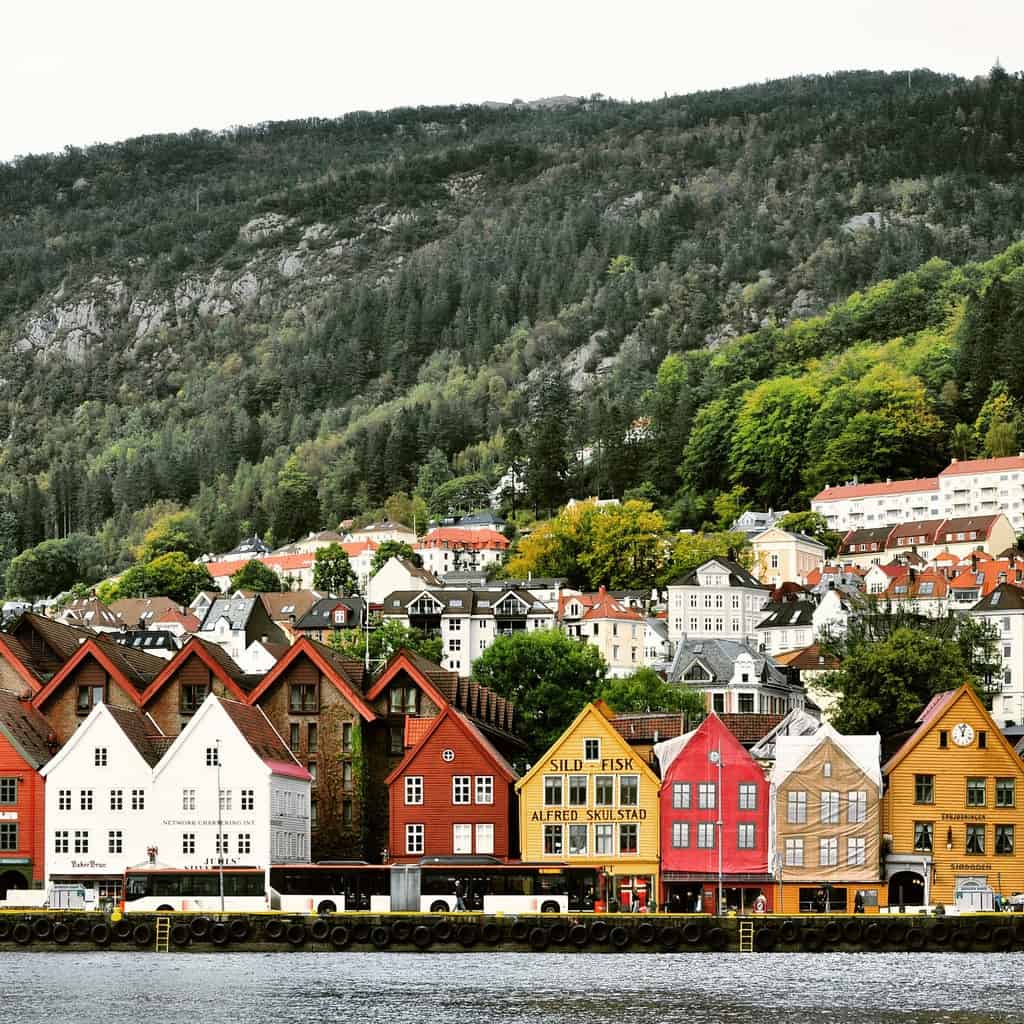This post contains affiliate links for which I may make a small commission to help keep the site running. You will not be charged extra for these items had you not clicked the links. Thank you for your help to keep the site running!
Whether you’re an expat, a study abroad student, or the occasional traveler, culture shock is not a foreign concept.
Well, if you want to get technical, it actually is a foreign concept, but you know what I mean.
We often use the phrase, “culture shock” to describe the feeling of being awed by a foreign culture that is so different to our own.
Most short-term travelers will only ever experience this stage and it’s what makes our Instagram photos a little brighter and our adventurous vacation stories funnier.

But what happens when you find yourself in a foreign country longer term, for instance if you’ve moved from America to the UK, and are trying to learn how to overcome culture shock rather than revel in it?
There are five stages of culture shock, and not all of them are full of whimsical modeling shots in front of famous landmarks.
Hey, sidenote! If you’re traveling to London, why don’t you join my Facebook group where you can ask questions, get advice or just look at pretty pictures of this part of the world! Just click here to request to join and I’ll add you!
First, let’s talk about the phases of culture shock and what causes culture shock, and then we’ll talk about how to overcome culture shock, or at the very least, how to survive culture shock.
If you want more reading, I would really recommend this book on culture shock which provides some additional tips on coping and getting through.
Five Stages of Culture Shock: Explained
Stage 1: Honeymoon Stage of Culture Shock
The honeymoon phase of culture shock is the phase where everything about your new home is SO AWESOME and OH MY GOD I AM NEVER LEAVING and you are taking pictures of garbage on the street because it’s SO FASCINATING and you just can’t get over HOW BEAUTIFUL and WONDERFUL everything is.
It’s a great stage to be in, and it’s what makes travel so interesting and engaging for me and many others.
You’re just soaking up all of the quirky and unusual things to do in London or the free things to do in Edinburgh and you’re super happy about it.
At this stage of culture shock, you’re probably not quite wondering how to overcome culture shock, because who is going to want to overcome a euphoric stage where everything is incredible?

Stage 2: Negotiation Stage of Culture Shock
Unfortunately, for many, the negotiation stage of culture shock will hit hard after the honeymoon phase and you’ll now be the person frantically googling “how to survive culture shock” or “how to overcome expat homesickness.”
I’m not going to sugarcoat it.
This stage is hard.
If the Honeymoon stage is the WONDERFUL phase, this is the HORRIBLE stage.
You’re homesick.
You are SO FRUSTRATED that you can’t get your favorite foods and are beating down the doors of the American food stores in London.
You start to pick out the differences in culture, and not in a happy way.
For many people, loneliness will kick in as you feel isolated.
You will want to go home even though you can’t.
Everything SUCKS and WHY DO THESE PEOPLE EVEN LIVE LIKE THIS, and, EVERYTHING IS SO MUCH EASIER IN YOUR HOME COUNTRY.
But don’t worry, this stage ends too.

Stage 3: Understanding or Adjustment Stage of Culture Shock
This stage of culture shock is where you really start to learn how culture shock operates and how to overcome culture shock.
You still notice the differences in culture, but you’ve got yourself a brand new positive attitude and you’re ready to get over yourself and the fact that not everything is the same.
You treat your experience with a sense of humor and ability to adapt and move forward and you’ve likely developed your own favorite places or snacks or shops in your new city.
You may still feel some feelings of frustration in this stage – in fact, I’ve lived in the UK for almost 6 years as an American and I still feel frustrated at certain points, but that’s normal.

Stage 4: Acclimation Phase of Culture Shock
Not everyone will make it to this phase depending on the length of their stay, but the acclimation phase is when your new city stops becoming a ‘foreign’ city and becomes your home as well.
It’s one of the best of the five stages of culture shock.
There is a lot of emphasis in this stage of being able to participate comfortably in the host culture.
You are still technically a foreigner, and your accent might give you away, but you rarely feel like one.
You begin to be the one giving advice to people on the best places to go and things to do or explaining “how it’s done around here.”
I would also say that the acclimation phase of culture shock involves a more gut-feeling understanding of the culture and language.
It’s the point where you stop “thinking” in your original culture and start immediately reaching for the current terminology in your current culture.
Of course, you’ll never 100% be acclimated if you’ve spent enough time in your home culture, but in this stage of culture shock, you’re pretty much there!

Stage 5: Re-entry Phase of Culture Shock
People don’t often think about the re-entry phase of culture shock, but it’s important to mention as you should expect to return to your home culture with some of the same feelings as when you started your travels.
When I re-entered America after my first semester abroad as a study abroad student in London, I was incredibly sad and irritable, only thinking about the experience I had left behind.
Things seemed too loud, too big, and too “in my face.”
I now know that this was because I had adjusted to British culture and was just going through the opposite culture shock that I had experienced when I arrived in England, but it can be incredibly disorienting if you’re not prepared to experience re-entry culture shock.
What Causes Culture Shock?
Culture shock is simply the discomfort that happens when the current culture we’re in is significantly different from the culture we’re used to.
It is a natural anxiety provoked by a mismatch of culture and/or language.
You don’t have to be in a country that speaks another language than your native one to experience culture shock.
In fact, many American visitors to the UK assume that they’re not going to experience culture shock because they speak the same language.
Not true!
Culture is more than just the words we use.
It is the way we express emotion, the daily behaviors we consider acceptable or unacceptable, the beliefs we hold about the world, and the practical processes that help us get through the day (for a great example of this, let’s talk about how in the UK they don’t bag your groceries for you – most Americans aren’t used to this and end up sitting at the end of the grocery lane like deer in the headlights not knowing they’re supposed to do it themselves!)

How to Overcome Culture Shock
Culture shock is something that many, many people go through.
It’s a normal part of going to a new culture, so I don’t think we should be thinking about it like, “how to overcome culture shock” or “how to survive culture shock,” but rather, “how to cope with culture shock.”
While there are sources out there to help deal with culture shock and I know that many study abroad programs do briefly let their students know what to expect, I don’t think we talk about it enough.
1. Be Honest with Each Other
Especially in today’s culture where we all put beautiful filters on our photos and share our every move through social media, no one wants to be the downer.
I remember a specific day during my first study abroad program about three months in where I was feeling extremely negative and lonely.
But on my blog that day, I instead decided to suck it up and write a post about how grateful I was to be in London because I felt so much pressure to enjoy every second and to let people know that I was having the greatest time of my life.
But, you know what? I wasn’t feeling grateful that day, and it certainly wasn’t the greatest day of my life!
I spent the evening locked in the bathroom, sprawled on the floor like an octopus, crying on the phone to my best friend about how much I wanted to come home and how difficult it was to adjust sometimes.
I needed other people to talk to instead of just unloading everything on her, but I was too afraid to share that in case someone thought I wasn’t being appreciative of the opportunity I had.
So, my first tip on overcoming culture shock to everyone who is about to leave for a new semester abroad or those about to become expats: be open about your experiences with culture shock.
The ‘down’ stages of culture shock don’t last forever, but maybe if we all shared them when they were happening, we would be less likely to be locked in a bathroom crying and more ready to open up to the people and new friends around us.

2. Be Patient
Moving abroad is one of the easiest choices I’ve ever made, but one of the hardest things I’ve ever done.
You are not the first or last person who has felt the stages of culture shock, so just embrace it and know that it will get better.
It’s also important to remember that the stages of culture shock are a guideline that most people will go through, but you very well might go through them in a strange order; you may skip the Honeymoon phase, or you might find that it takes you years to get to the Acclimation stage.
There’s no right or wrong way to handle the emotions that come with living abroad, so be patient with yourself when figuring out how to overcome culture shock.
3. Ask to Speak to Someone
If there is one thing I’ve learned after being a part of the study abroad and expat community for a few years, it’s that there is always someone willing to listen who was probably just dying for you to bring it up so they can feel comfortable sharing their own struggles as well.
And if you don’t feel comfortable speaking to a peer, seek out a therapist who specializes in culture shock who can help guide you through the process of adjusting to a new culture and how to get over culture shock in your own time.
It’s not at all shameful to admit that you’re struggling, and in fact means that you’re having a normal reaction to living abroad.

4. Keep Yourself Busy
I completely understand that sometimes, coping with culture shock means crying yourself to sleep and pouting.
But don’t let that be the major way you deal with culture shock, because you’re going to be missing out on a whole world that could actually work to distract you from what you’re feeling.
Force yourself to get out of bed, to find a new museum to experience, even to sit on a park bench for a couple of minutes and try and soak in the atmosphere around you.
Whether you chose to move abroad or you had to, culture shock doesn’t have to stop you from going about your daily tasks and in fact, it’s better if you do them regardless.
There were so many times on my worst days where my mood was instantly changed just by getting out in the world and forcing myself to try and see something from a different vantage point.
I’m not saying that you will instantly forget all of your culture shock struggles, but distraction is often the best medicine.

5. Be Kind to Yourself
I’ve said it before and I’ll say it again: you’re normal.
It’s okay. It is absolutely, 100% okay to experience culture shock.
It is not a disease or a sign that you’re doing something wrong or not appreciative of your overseas experience.
It means that you’re human, and you have been accustomed to one way of doing things.
Be kind to yourself.
You don’t have to overcome culture shock by loving the place you’re in, but you can love yourself enough to take care of yourself.
Eat healthy foods, take some time alone if you need it or push yourself to go socialize if you traditionally feel better after talking to people.
The fact that you’re trying to get over culture shock means that you were strong enough to move to a new place, and that’s something to really be admired and respected.
You’ve got this, and you will get through this, whether you think you will or not. Just promise me you won’t call anyone from the bathroom floor. Been there, done that, would not recommend.



A great post! You really have made me feel so much better about what I’m going through. When I had my cookies meltdown my man really wasn’t sure how to handle it and it was very clear he just didn’t understand how I was feeling at all or how to help. But, I think he’s beginning to understand a little… being able to read about others who are feeling the same way has helped us both to see that I’m not just crazy and that this phase is quite normal. Even humorously so. It’s given me some ideas for my next novel :p
I absolutely adore England, but I do also miss the place I called home for 24 years and all the little comforts and traditions. Reading about you crying on the floor then blogging about how wonderful it all is sounds just like something I might do… but we don’t always have to put on a brave face. I think all of us go through homesickness at some point and in some form. I’m definitely in the “negotiation phase” :p.
Thanks for the blog shout-out 🙂
Yes, your cookie incident just made me go back through all the times when something so little set me off and people around me were like, “…what?!?! What is the problem?!” But now that I’m on the ‘other side’ for the most part, I can laugh about it. 😀
Just wait for the sequel to this post on ‘reverse culture shock’ once you go back to Canada for the first time after living here for awhile…you’ll be so excited in the beginning to be ‘home’ and then you’ll be sad and missing the UK, haha! Such an emotional rollercoaster. 😀
I’ve really never reacted to change well AT ALL. Case in point when I was eight years old and Tim Hortons changed their chicken soup recipe I filled out about 50 comment cards telling them to change it back. Exhibit B: when Food City (grocery store) changed their name to Sobey’s I balled to the cashier because “Food City makes sense and Sobey’s sounds stoopid!” And that was only last week. (Kidding, I was like five). Clearly food-related things set me off haha
I am just about the last person I ever thought would move away from the familiar; when all my friends moved hours away for University I went to the one closest to home and my parents practically lived there (they’d visit like 3x a week).
I’m sure Canada will seem much different when I go back :p Canada stopped feeling like home for me a while ago because my man wasn’t there and the house we were making a home was here.
But I would do unspeakable things for a dill pickle or an East Side Marios dinner right about now :p
I’d miss my Tyrell’s Salt & Vinegar chips though! They’re my first UK addiction and hopefully the first of many!
What’s your favourite UK food item? 🙂
That’s so funny! I was sort of the same–a REALLY timid child that never would leave my mom and I was so shy all growing up. No one would have guessed I would be the one moving to another country! I guess we surprise people. 🙂
Mmmm, I love Hula Hoops (which I think are a children’s snack but I don’t care)! They’re so crunchy and salty and amazing. I’ve never had Tyrells salt and vinegar–next time I’m at the store!
Ill have to try these hula hoops if I see them!
I think you’re exactly right. So much of who we are is made up of where we grew up and ‘come from,’ so it’s really comforting when you can share that with someone in a foreign country. Hope you get to live in Germany someday like you want!
I’ve definitely had a few tearful, frustrated phone calls, both from the UK and when I spent a term in South Africa in college. I’d like to think I’m in the acclimation phase now but sometimes when things go wrong/I can’t figure out how to do something I definitely revert.
What a load of crap